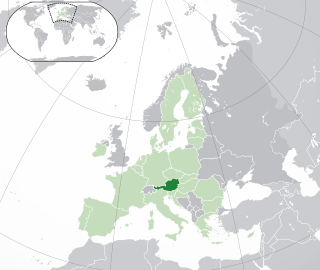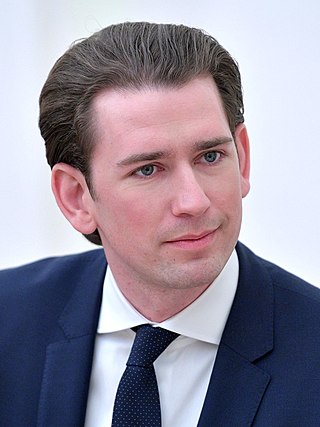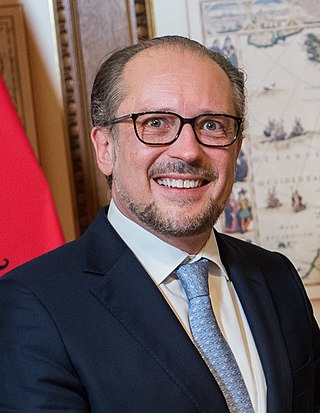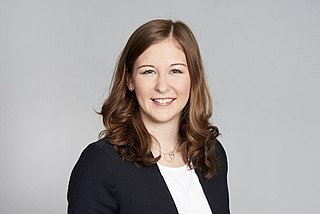
Politics in Austria reflects the dynamics of competition among multiple political parties, which led to the formation of a Conservative-Green coalition government for the first time in January 2020, following the snap elections of 29 September 2019, and the election of a former Green Party leader to the presidency in 2016.

Lesbian, gay, bisexual, and transgender (LGBT) rights in Austria have advanced significantly in the 21st century. Both male and female same-sex sexual activity are legal in Austria. Registered partnerships were introduced in 2010, giving same-sex couples some of the rights of marriage. Stepchild adoption was legalised in 2013, while full joint adoption was legalised by the Constitutional Court of Austria in January 2015. On 5 December 2017, the Austrian Constitutional Court decided to legalise same-sex marriage, and the ruling went into effect on 1 January 2019.

Elisabeth Gehrer is an Austrian politician for the Austrian People's Party (ÖVP). From May 1995 until January 2007, Gehrer was Federal Minister of Education, Science and Culture, at first in grand coalition governments headed by Franz Vranitzky and Viktor Klima, and from 2000 onwards in Wolfgang Schüssel's coalition government. From 1999 to 2007, she also served as vice party chairperson of the Austrian People's Party (ÖVP).
Same-sex marriage in Austria has been legal since 1 January 2019. On 4 December 2017, the Constitutional Court ruled that the non-discrimination and equality provisions of the Constitution of Austria guarantee same-sex couples the right to marry. The decision took effect on 1 January 2019, making Austria the second country in Central Europe to legalise same-sex marriage after Germany, the 16th in Europe, and the 25th worldwide. Austria has also recognised same-sex registered partnerships since 1 January 2010, providing several, but not all, of the rights, benefits, obligations and responsibilities of marriage.

Legislative elections were held in Austria on 28 September 2008 to elect the 24th National Council, the lower house of Austria's bicameral parliament. The snap election was called after Austrian People's Party (ÖVP) withdrew from the ruling grand coalition with the Social Democratic Party of Austria (SPÖ) in July. Due to dissatisfaction with the governing parties, the opposition and minor parties were expected to make significant gains. Opinion polling indicated that up to seven parties could potentially win seats.

Gudrun Veronika Kugler, née Lang, also known as Kugler-Lang, is a Roman Catholic theologian, jurist, and ÖVP-member of Austria's National Council.
NEOS – The New Austria and Liberal Forum is a liberal political party in Austria. It was founded as NEOS – The New Austria in 2012. In 2014, NEOS merged with Liberal Forum and adopted its current name.

Sebastian Kurz is a former Austrian politician who twice served as chancellor of Austria, initially from December 2017 to May 2019 and then a second time from January 2020 to October 2021.

Legislative elections were held in Austria on 15 October 2017 to elect the 26th National Council, the lower house of Austria's bicameral parliament. The snap election was called when the coalition government between the Social Democratic Party of Austria (SPÖ) and Austrian People's Party (ÖVP) was dissolved in May by the latter party's new leader Sebastian Kurz.

Legislative elections were held in Austria on 29 September 2019 to elect the 27th National Council, the lower house of Austria's bicameral parliament. The snap election was called in the wake of the Ibiza affair in May, which caused the resignation of Vice Chancellor Heinz-Christian Strache and the collapse of the governing coalition of the Austrian People's Party (ÖVP) and Freedom Party of Austria (FPÖ). The government subsequently lost a motion of no confidence in parliament, and ÖVP Chancellor Sebastian Kurz was replaced by non-partisan Brigitte Bierlein on an interim basis.

Margarete Schramböck is an Austrian business manager and politician who served as minister of digital and economic affairs in the Second Kurz government, the Schallenberg government and the Nehammer government from January 2020 to May 2022; she previously served in this position from December 2017 to June 2019 in the First Kurz government. From May 2016 to October 2017, she was the chief executive officer of A1 Telekom Austria. Schramböck is a member of the Austrian People's Party.

Alexander Georg Nicolas Schallenberg is an Austrian diplomat, jurist and politician who has served as Minister of Foreign Affairs in the government of Chancellor Karl Nehammer since 2021, previously holding the office from 2019 to 2021. A member of the Austrian People's Party (ÖVP), he held the position in the second government of Sebastian Kurz, before briefly serving as Chancellor of Austria as Kurz's successor from 11 October to 6 December 2021.
In the run-up to the next Austrian legislative election, various organisations carry out opinion polling to gauge voting intentions in Austria. Results of such polls are displayed in this list; the date range for these opinion polls are from the 2019 Austrian legislative election, held on 29 September, to the present day. The next election is likely to be held in 2024.

Beatrix Karl is an Austrian academic and politician. A former member of the National Council, she served as Minister for Science and Research (2010–2011) and as Minister of Justice (2011–2013) in the first Faymann government.

The Second Kurz government was the 33rd Government of Austria. Led by Sebastian Kurz as chancellor and Werner Kogler as vice-chancellor, it was sworn in by President Alexander Van der Bellen on 7 January 2020. It was officially dissolved and succeeded by the Schallenberg government on 11 October 2021.

Christine Aschbacher is an Austrian People's Party politician who served in the Second Kurz government as minister of labour, family and youth between January 2020 and January 2021.
Legislative elections will be held in Austria by 2024 to elect the 28th National Council, the lower house of Austria's bicameral parliament.
Events in the year 2021 in Austria.
On 6 October 2021, Austrian anti-corruption prosecutors conducted a raid on the offices of Federal Chancellor Sebastian Kurz, the headquarters of the Austrian People's Party, and the Federal Ministry of Finance. Kurz, along with nine high-profile politicians and newspaper executives, has been accused of embezzlement and bribery. According to the prosecutors, public money has been misused to fund politically motivated and occasionally manipulated opinion polls, with the funding being conduited through advertisements in the Österreich newspaper on behalf of the Federal Ministry of Finance.

Claudia Plakolm is an Austrian politician of the People's Party (ÖVP) and State Secretary in the federal government of Nehammer. She was sworn in as a member of the National Council on November 9, 2017. Since May 15, 2021 she has been the federal chairman of the Young People's Party (JVP).













